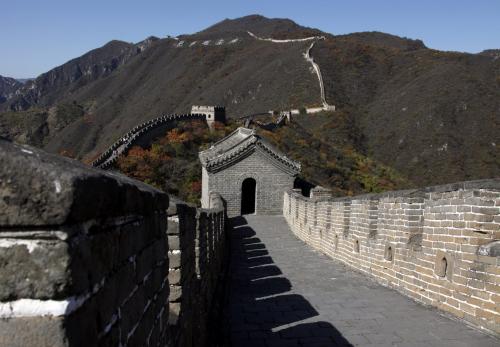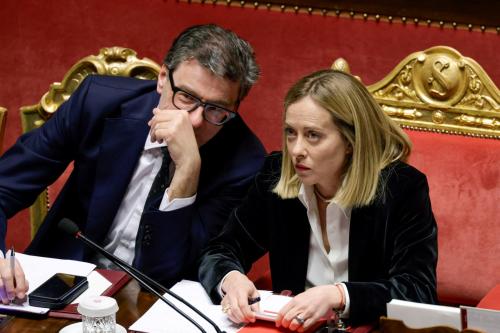Last week, South Korea responded to North Korea’s January nuclear test and February satellite launch by announcing that it would suspend operations at the Kaesong Industrial Complex (KIC), the last remaining site of economic cooperation between the two Koreas. A number of Korea watchers have criticized the decision, calling it short-sighted and counter-productive.
These arguments are wrong. Closing Kaesong is the right call, for several reasons.
The most significant is that Kaesong provides income directly to the North Korean regime’s inner circle, rather than contributing positively to the broader North Korean economy. Because of this, projects like Kaesong don’t undermine or transform the Kim regime. They prolong and solidify its rule. It’s hard to see what benefits Kaesong is producing that could be worth that price.
Those arguing for engagement with North Korea via Kaesong and other projects typically argue that engagement will achieve one of two things. Either it will directly influence the regime itself to adopt more constructive and cooperative policies, or it will contribute to a transformation from below that will eventually lead to political evolution for the better.
Neither has happened. North Korea has, if anything, doubled down on confrontation as its modus operandi, and its nuclear status is now enshrined in the constitution.
The country has experienced a significant transformation from below, but as I have demonstrated elsewhere, government-run engagement projects played essentially no role in that transformation. Instead, North Korea’s marketization and social transformation have been driven by the collapse of the public distribution system in the late 1990s and the resultant rise of a black market that relied heavily on illicit cross-border trade with China.
Where did Kaesong feature in that process? Nowhere. Transformation has happened in spite of Kaesong-style engagement, not because of it.
What Kaesong has done, actually, is pumped money into the ossified and dysfunctional regime-controlled economy, which has long insulated the Kim regime from pressure towards meaningful economic reform.
In terms of its political effects, the income from Kaesong should be thought of in the same way as the income North Korea gets from exporting laborers to countries in the Middle East, Southeast Asia, and Africa. The major difference is geography. Those countries pay North Korea in US dollars, but the regime distributes salaries to the workers in North Korean won – probably after pocketing about 40%, and using the less favorable official exchange rate (as opposed to the black market rate used throughout most of the country).
This payment structure is the very definition of authoritarian patronage. It allows the government to capture foreign currency at the point of entry, skim off the profit, and then distribute the benefits to a small group of workers that it’s hand-picked to receive the benefits.
There’s fairly conclusive evidence that income earned and distributed this way strengthens and prolongs, rather than undermines, the regime’s hold on power. That seems like self-defeating behavior, even before you consider the possibility that the $560m in cash that South Korea has invested in Kaesong since 2004 has contributed to the North’s nuclear, missile, and military programs, as Seoul’s Minister of Unification claimed – though then appeared to retract – this past week.
This kind of income is also very different from that earned via trade with China, which is much more broadly distributed throughout North Korean society from the start. Arguments that Kaesong can be kept open because inter-Korean trade is dwarfed by trade with China miss the point. It’s where in the system the money goes that matters.
The similarity in payment structure between the KIC and North Korea’s other overseas labor contracts raises a second reason why it makes sense to close Kaesong: credibility. It makes little sense for South Korea to ask the international community, including China, to tighten sanctions on the North when Seoul is literally delivering cash in bulk across the border.
Lastly, those saying that Kaesong should be kept open have appealed to a humanitarian argument, suggesting it’s a worthwhile venture because the complex provides income, better working conditions, and information to the 55,000 North Korean workers employed there.
But this argument not-so-implicitly suggests that the limited benefits Kaesong provides for the 00.2% of North Koreans who work there are worth the obvious and significant costs imposed on the country’s other 23 million inhabitants. That’s a tough argument to justify, either strategically or morally.
At Kaesong, only a tiny fraction of the North Korean population, hand-picked by Pyongyang, were receiving this information. If the goal is to provide information, there are probably better, more efficient ways to do that, without the same costs. Wouldn’t Seoul get better value for its money if it spent its next half-billion dollars getting information to the millions of North Koreans who actively seek it out on the country’s black markets, rather than paying regime officials to distribute it to cronies who are among the least likely to be receptive?
Finally, although Kaesong’s working conditions are no doubt better than those reported in, for example, Qatar or Malaysia, impending sanctions don’t target overseas labor income based on human rights considerations. Non-proliferation and coercive diplomacy are the primary goals. In that sense, the conditions of the laborers are not the relevant consideration: the money that the projects provide to the regime and its military efforts are. And if the price of better working conditions for 55,000 North Koreans is the imprisonment of an equal (or more likely, far greater) number in prisons and labor camps, it’s hard to see how that is a humanitarian trade worth making.
At one time, Kaesong-style engagement may have been an experiment worth trying. But it’s hard to make that case with the amount of evidence we’ve accumulated.
Projects like Kaesong haven’t moderated North Korea’s international behavior. They have provided minimal – if any – net benefits to ordinary North Koreans. And they strengthen and prolong the regime, rather than undermining or transforming it.
What kind of cooperation, exactly, is worth that price?
The Brookings Institution is committed to quality, independence, and impact.
We are supported by a diverse array of funders. In line with our values and policies, each Brookings publication represents the sole views of its author(s).



Commentary
Op-edBetter late than never: Why closing Kaesong is the right call
February 17, 2016